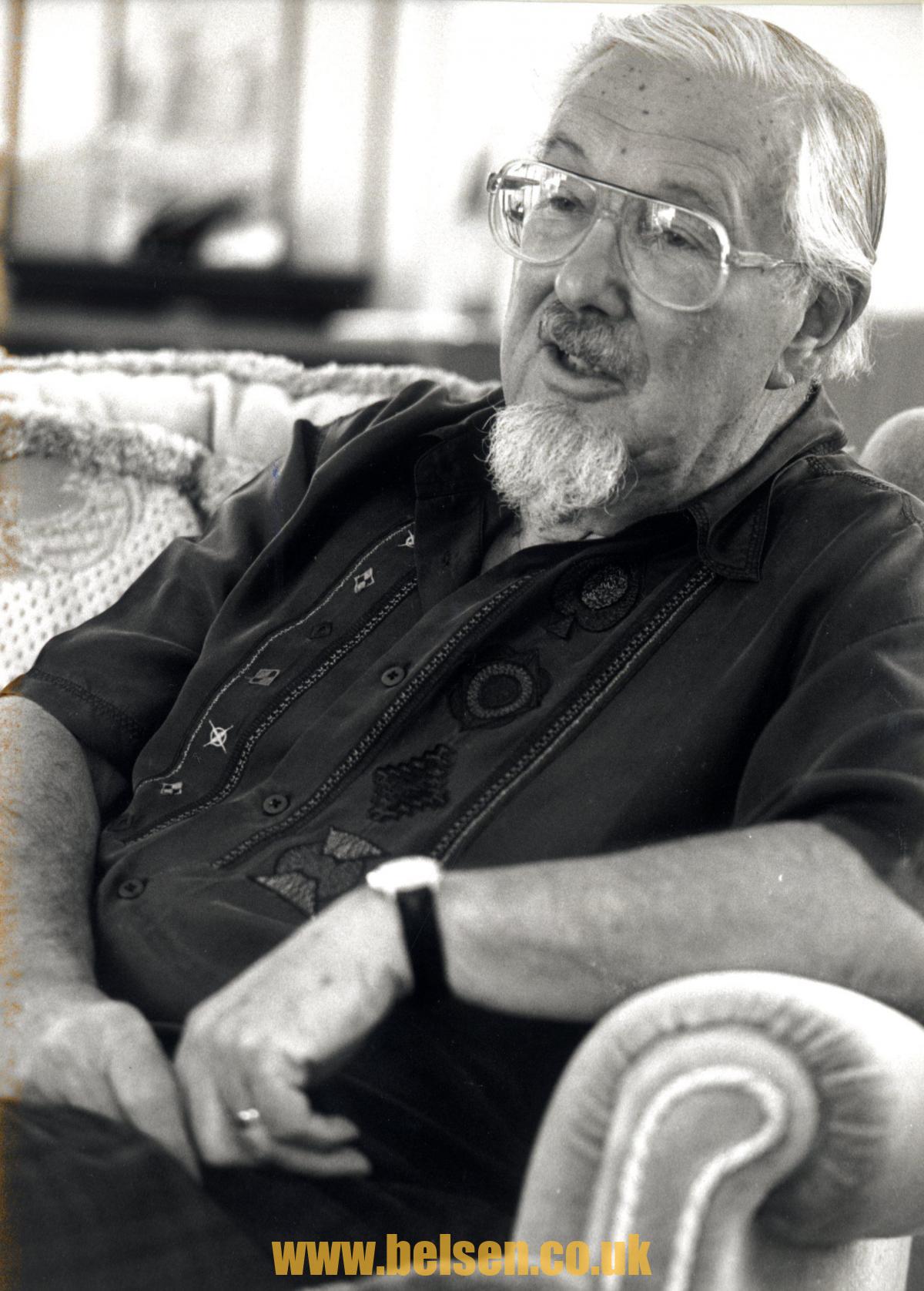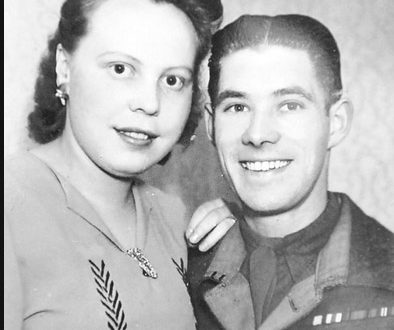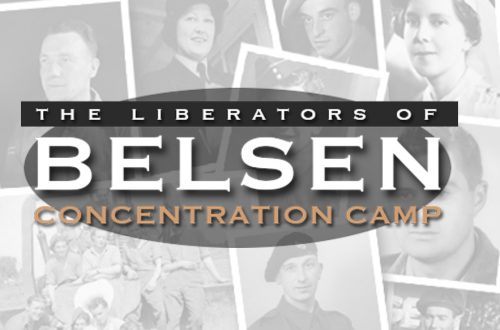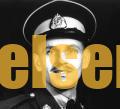
Kenneth Knight – RAMC
I am Kenneth Claude James Knight, now aged 85 (article dated November 2003 – Ed) and living in Dorset.
 Mine was not really a military family, although my father had served in the Great War. My third Christian name is in memory of an uncle killed around the time I was born. I was educated in Essex and at London University Extension Classes (under Prof H Finder). I served in local government until 1940, when I was called up into the RAMC. Basic training at Aldershot was followed by Light Field Ambulance in Yorkshire – a magnificent unit, as will soon be revealed.
Mine was not really a military family, although my father had served in the Great War. My third Christian name is in memory of an uncle killed around the time I was born. I was educated in Essex and at London University Extension Classes (under Prof H Finder). I served in local government until 1940, when I was called up into the RAMC. Basic training at Aldershot was followed by Light Field Ambulance in Yorkshire – a magnificent unit, as will soon be revealed.
As part of the 27th Armoured Brigade we crossed to Gold Beach and I landed at Oustreham on D-Day (plus one). (Some of the places the main unit visited are in the Colonel’s order of the day. See the appendix.) This story is, however, about my own encounter with the infamous Belsen concentration camp. With my section (commanded by Capt Douglas Peterkin), I arrived at Belsen (properly – Bergen Belsen) on 17 April 1945.
With a few senior NCOs, I wandered round the camp that April evening with the stench of deceased and dying skeletons all around us – nobody said a word, except for those prisoners still alive, who had the strength to utter, ‘Ich habe kranke!’ (‘I am sick!’) Some of those poor creatures made it clear that they wanted food – sadly we could not give any. They were so emaciated that their bodies could not have coped with anything but special diets, specially administered (again see appendix). Their stare, through dull and lifeless eyes, had to be seen to be believed. They were prisoners because of faith, profession or whatever made them unacceptable to those said to be in authority.
Initially I thought, ‘How can a loving God allow this?’ In saner moments, however, I knew this was a clear example of man’s inhumanity to fellow man. I did write to my father, then a church warden, and received a most understanding reply.
Despite witnessing the horrors of war in France, Belgium, Holland and Germany, I found Belsen an ordeal beyond reality. 11th LFA became part of 6th Guards Division (superb units). Among other things, we had exercises with them about crossing the Rhine. There we dealt with numerous casualties and worked incessantly, all that was expected – but Belsen… that was something different. Someone called it ‘incomprehensible, ‘an apt description.
The camp was one of a number in that truly beautiful part of Germany. It was not originally an extermination or work camp, like, for instance Dachau, but was meant for housing prominent persons, who could be used as bargaining tools to secure the release of Germans imprisoned abroad. This plan went wrong and within a year Belsen had become a concentration camp without medical facilities. Transfer to Belsen became, in effect, a death sentence.
After the building of a lager for women, the infamous and detestable Joseph Kramer became commandant. Under him the camp’s population increased from 15,000 to over 41,000, and it was at that point that chaos began to reign at Belsen, according to official information.
I was also informed that at the beginning of April, with the sound of allied guns getting louder, SS guards endeavoured to conceal some of the 10,000 corpses lying exposed, but the guards fled before the gruesome task was completed. So the decision was taken at a very high level to bury thousands of dead by means of huge pits and bulldozers. What a task for those concerned in the REs, etc! German doctors and nurses, along with Jewish rabbis, Hungarian priests and others, were everywhere. The last of the pits were dug and filled, and then arrangements for repatriation where put in hand and the trials of Kramer and the rest of them implemented.
All of this was most painful to me. It did however assist me in obtaining greater perspective and appreciation of life – what is good and, particularly, what is bad. The experience of all who were there (mostly religious) turned us rigid. I was inside the camp boundary for nearly six weeks and all agreed with the colonel’s word that life will never feel the same to those who experience something of this enormity.
But in years since, I have felt that above all it should not be forgotten. Some people – too young to have been in the war and with the scepticism bred from a life of comparative peace – have pretended that the Holocaust didn’t happen, perhaps because they find such stories impossible to believe. I was there – I saw dreadful things. I saw souls on the point of or actually dying, and even after all these years I can still hear the mournful sound of those voices calling out, ‘Ich habe krank!’
The situation in Bosnia bought it all back to me. Why don’t we ever learn?
Following Belsen, most of us went to that wonderful country, Norway. I was returned to the UK and demobbed from Pembroke. Wiser? Yes, and certainly older and more of a man. Although, like others, I complained about everything at the time, I am glad it has been part of my life. I became involved again in religious affairs and also travel both at home and abroad. Very pleasant times have been spent in Germany, although I have not returned to the Belsen area. I have no ill feelings about the German people, of course, but let us all ensure that the memory of the evil, which led to the concentration camps, shall endure to remind us of our responsibilities – to forget is to deface the memory of those who suffered.
Appendix
(The Colonel was of course known as the ‘Old Man’. He knew it – we all knew it! He used to go around the unit with a kind of buzz, whether in a good or bad mood. Hence his other nickname of Buzz Gonin.)
Colonel Gonin’s order of the day 1945:
‘The unit will always be remembered for what some of you did on D-Day with 27 Armd BDE. For those uncomfortable weeks at Hermanville before Caen fell. For the restless months from Coumont to Maas, when you made yourselves a reputation with the guards that any unit might envy. With the guards you helped to clear the Sittard Triangle and with them took part in the muddy bloodless battles of Cleave and Goch. Since 27 Feb and the formation of the Bank Group, you have not had more than two days’ consecutive rest, and at the Rhine you evacuated 1,700 casualties in 56 hours, a role which has never been undertaken by any unit in the history of warfare. Finally, and again with the 6th Guards Armoured Brigade, you shared with the Americans in the capture of Munster. For all this you have received well-deserved acknowledgement from higher command.
You then undertook what for this unit was the thankless and unspectacular task of clearing Belsen Concentration Camp. Our American friends and yourselves, with the BRCS, have moved over 11,000 sick from Belsen. To do this, 63 of you have worked for a month amid the most unhygienic conditions inside huts where the majority of internees were suffering from the most virulent disease know to man. You have had to deal with mass hysteria and political complication, requiring the tact of diplomats and firmness of senior officers. During the first ten days in the concentration camp, and before an organised attempt had been made to load the sick in those huts, you distributed 4,000 meals, twice daily, from what RSM Marne could scrounge by initiative and subtlety.
By collecting medical equipment from all over Germany, you produced a dispensary, which has supplied drugs for 13,000 patients a day, and has met the demands of exitable [sic] medical officers of all races, requiring the most exotic drugs in half a dozen different languages. You have, without hesitation, acted as undertakers, collecting over 2,000 corpses from the wards of the hospital area and removing them to the mortuary — a task which the RAMC can never before have been asked to fulfil.
The cost has not been light: twenty of you contacted Typhus-A disease, causing great personal suffering. Thank God, all the patients are doing well.
One of us will never leave Belsen — a dawn attack by the German Air Force on our lines was the price he paid to come here.
Life can never be quite the same again for those who have worked in the concentration camp, but you will go with the knowledge that the 11 (BR) LT FD Amb has done a good job.
Brig HI Glyn Hughes, CBE DSO MC, and Lt Col JAD Johnston, MC, SMO, Belsen Camp, join me in thanking you all for the part you have played in achieving the impossible.
Lieut Col MW Gronin RAMC, commanding No. 11 (BR) Light Field Ambulance’
Dorset Echo.
Tomorrow marks the 75th anniversary of the liberation of the German concentration camp Bergen-Belsen.
Ken Knight was one of the first men through the gates. He spoke movingly about the experience to the Dorset Echo in 2003. Here we re-publish the interview with Ken who passed away in 2007.
ON a bright April day in 1945, Ken Knight walked through the gates of hell.
As a committed Christian it was an experience he had hardly contemplated realising in the hereafter, let alone as a young man in the prime of life. He was met by the diseased and the dying, the skeletal frames of proud people persecuted simply because their birthright has been viewed as an inalienable wrong in the eyes of others.
There were also the innumerable dead; those too weak, too starved, too dispirited to carry on clinging to what now passed as an excuse for life.
It was, in the stark, echoing words of Ken: “The product of man’s ultimate inhumanity to his fellow man.”
The gates he walked through on that inappropriately pleasant spring day were those of Bergen-Belsen, the notorious Nazi Second World War concentration camp, reviled and remembered by everyone except, undoubtedly, the perpetrators of the evil it spawned and their apologists, as hell on earth.
“What I remember most when I walked through the gates were just three simple words,” recalls Ken.
“They were “Ich habe kranke”, and they were the most understated yet harrowing words I have ever heard.”
Those words mean simply “I am sick”, and they were uttered repeatedly by people who stared with dull, lifeless eyes at those who had come to free them from the savage oppression of the Nazi regime. There were tens of thousands of people in the camp; about 10,000 were dead and the rest in various stages of deterioration.
“I can never forget the stench, the bodies, the despair. Many of the living were naked, begging for food and just murmuring, “Ich habe kranke”.
“Yet they were so ill we just couldn’t feed them straight away. They had to have a specially controlled diet or their bodies would not have been able to cope.
“It was the ultimate irony that after years of brutal persecution these pathetic souls could have been killed by a moment of kindness.”
Ken, then 84, and living in retirement in Sutton Poyntz, said he could never forget the memories of Belsen – nor did he want to.
“It is not something I have ever felt comfortable talking about. It seems, almost, is if one is boasting about doing something wonderful.”
For a mild-mannered man he bristled with indignation at those, like the controversial right-wing historian David Irving, who would seek to deny that the Holocaust ever happened.
“I was there, I saw the horror and we simply must never forget what happened. It makes me so angry that there are people who try to either justify it or claim it never happened.
“I saw the dying, the dead being buried and the utter humanity of what went on.”
Ken was one of the first men to enter Belsen as the defeated Nazis fled the killing camps as the Allies closed in. He was with the Royal Army Medical Corps (11th Light Field Ambulance) and had landed at Gold Beach at Ouistreham on D-Day plus one.
His was not a predominantly military role although he had the military in his blood; his father had fought in the First World War and his grandfather in the Boer War. He grew up in Norfolk and later moved to London before starting work in local government in Essex.
He joined up in 1940 and underwent his basic training at Aldershot before being posted to various barracks around the country.
Despite witnessing all the horrors of war in the battles across western Europe, he had no idea what he was to face when an officer took him and his colleagues aside and told them they were being sent on a special assignment.
The Field Ambulance crew were attached to the 27th Army Brigade but became detached while trying to cross the Rhine to join up with the 6th Guards Armoured Division for their eventual run into Germany.
There were major casualties during the fierce fighting for control of the river’s crossing points and the Field Ambulance members were working overtime to deal with their wounded comrades.
They worked feverishly in treacherous conditions, constantly retrieving casualties under fire, but it was what they expected of war.
Belsen, however, was the unexpected; the incomprehensible.
Belsen was not originally an extermination camp such as Treblinka nor a work camp like Dachau. It was established under the orders of Heinrich Himmler in March 1943 as a camp for prominent Jews whom the Nazis could use as bargaining tools to secure the release of Germans who were imprisoned abroad.
Initially, conditions were relatively good but rapidly deteriorated within a year, and it was euphemistically re-designated a “recovery camp”.
In reality, it became a cage for internees from other camps who were considered too ill to work. No medical facilities were provided so a transfer to Belsen was ultimately a sentence of death through disease or starvation.
In July 1944 a women’s camp was erected within the barbed wire barricades of Belsen to house women and girls evacuated from the east in the face of the advancing Red Army.
In December of that year the notorious SS Hauptsturmfuhrer Josef Kramer took over as camp Kommandant. An official census shows there were then 15,257 prisoners at the camp.
During the first few months of 1945 the number of inmates increased as thousands were evacuated from Eastern Europe to Belsen.
By March there were 41,520 in the camp, 18,168 of whom were dead by the end of the month.
This is the point at which the prisoners began to starve en masse as the food supply chain broke down and evidence of cannibalism was found in the camp.
At the beginning of April, as the sounds of Allied gunfire drew nearer, the SS guards tried to conceal the 10,000 unburied corpses. But the guards fled before the grisly task was completed.
So it was left to Ken and his comrades to set about the grim and heartbreaking job of burying the dead and trying to rescue the living from the brink of oblivion.
He said: “There were German nurses and Hungarian senior medical officers. We decided that burial had to be done as quickly as possible so a huge pit was dug and ceremonies presided over by Jewish rabbis and Hungarian priests. It was a dreadful sight.”
By May 19 the evacuation of Belsen was complete and arrangements made for the repatriation of the former inmates. Later the huts were burned to the ground and in September the trial of Kramer and other guards began.
The sadistic Kramer and 10 others were sentenced to death and hanged. It was the end of the road for them but a new beginning for thousands of the former inmates, many of whom settled in Palestine.
For Ken Knight it was a painful experience but one that gave him a greater perspective of, and appreciation for, life.
“I was religious but the experience shook me rigid. I remember writing to my father asking him how it could have happened. But over time I came to realise this was not God’s inhumanity to man, but man’s own inhumanity to his fellow man.
“I was at Belsen for five weeks and was sent to Norway for recuperation. I then went back to Pembroke and was demobbed in 1946. The colonel said before we left Belsen that ‘life can never be the same for anyone who witnessed the atrocities of the concentration camps’.
“He was right, but the most important thing is that we must ensure that it is never forgotten. That is the single most important thing. The situation in Bosnia brought it all back, and it makes me despair that some people will never learn.”
A slightly older but immeasurably wiser Ken Knight returned to local government and worked for the Local Authority Association before retiring to Dorset.
Faith undiminished, he worked as a churchwarden at St Andrew’s in Preston and became actively involved in village life in Sutton Poyntz. He had one son who works abroad and Ken has travelled extensively throughout the world. But he had never been back to Belsen.
“I always thought one day, maybe, but I doubt it now.
“I have had some very pleasant holidays in Germany and certainly bear no one any ill feelings over what happened.”
The inscription on the Belsen Memorial Stone says: “Earth Conceal Not The Blood Shed On Thee.”
It is people like Ken Knight who have ensured that the memory is kept alive for generations to come.
Ken passed away peacefully at his home on May 6 2007.
8,194 total views




